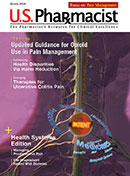Taipei City, Taiwan—Even though they are commonly used to relieve the discomfort of cold and influenza symptoms, nonsteroidal anti-inflammatory drugs (NSAIDs) might be a risky choice for patients with acute respiratory infections.
That’s according to a new report, published in the Journal of Infectious Diseases, which suggests that two potential cardiac risk factors—having an acute respiratory infection and using an NSAID—have a greater effect on acute myocardial infarction (AMI) risk when combined.
In the observational study led by researchers at National Taiwan University Hospital, a study team analyzed claims data from Taiwan’s National Health Insurance Program of nearly 10,000 patients who were hospitalized for AMI over a 7-year period, 2005 to 2011.
Each patient’s risk for heart attack over time, across episodes of respiratory illness and NSAID use, was compared, with results indicating a stronger association with AMI when both risk factors were present.
In fact, using NSAIDs during an acute respiratory infection was associated with a 3.4-fold increased risk for a heart attack, with 7.2 times greater risk when hospitalized patients received the pain-relieving medication intravenously, compared to patients with neither of the risk factors.
For comparison, study authors point out that AMI risk for patients with an acute respiratory illness but who were not taking an NSAID was 2.7 times greater, while the risk was 1.5 times greater when individuals took the painkillers but did not have an infection.
“Physicians should be aware that the use of NSAIDs during an acute respiratory infection might further increase the risk of a heart attack,” explained lead study author Cheng-Chung Fang, MD, of National Taiwan University Hospital. He urged patients seeking relief from cold and flu symptoms to consult with their pharmacist or physician before using NSAIDs.
Fang also proposed that another commonly used pain reliever, acetaminophen, might be a safer alternative, in terms of cardiac risk, for relief from cold and flu symptoms based on past research, although the drug was not evaluated in the study.
In a related editorial commentary, Charlotte Warren-Gash, PhD, MRCP, of the London School of Hygiene & Tropical Medicine, and Jacob A. Udell, MD, MPH, of the University of Toronto, note that the findings provide evidence for the dual effect of potential heart attack triggers and highlight the need for caution when using NSAIDs while future research explores the issue.
“Clinicians should consider both medical conditions and existing medications when prescribing NSAIDs for symptomatic acute respiratory infection relief,” Warren-Gash and Udell write.
« Click here to return to Weekly News Update.
Published February 22, 2017





